6 Days Study Plan: Body Fluids and Circulation | Biology Class 11 - NEET PDF Download
6 Days Study Plan: Body Fluids and Circulation
Let's dive into the Biology chapter "Body Fluids and Circulation," a crucial topic for the NEET exam. Analysis of NEET questions from 2016 to 2025 highlights its significance, with consistent questions on blood, lymph, circulatory pathways, and cardiac functions. Mastering this chapter is essential for understanding human physiology, a core component of the NEET syllabus.
Meeting Your Timetable Goals with EduRev! This 6-day study plan is designed to help you manage your time effectively, covering all key topics thoroughly. By following this plan diligently, you'll be well-prepared to tackle even the toughest NEET questions related to this chapter. EduRev simplifies your preparation with comprehensive resources, including notes, videos, and tests for every topic. Access these valuable resources, including documents, videos, and tests, here.
Chapter Overview
The "Body Fluids and Circulation" chapter in Class 11 Biology covers the following main topics:
- Blood and Lymph
- Blood Groups and Circulatory Pathways
- Human Circulatory System and Double Circulation
- Cardiac Cycle and Electrocardiogram (ECG)
- Regulation of Cardiac Activity and Disorders of the Circulatory System
This study plan spans 6 days, with 5 days for learning and practice and 1 day for revision. Recommended Tip: Review NEET Previous Year Questions (2016-2024): Body Fluids & Circulation to understand question patterns and the depth of study required.
Day 1: Blood and Lymph
Morning:
Read the sections on Blood and Lymph from the NCERT Textbook: Body Fluids & Circulation. Focus on the composition, functions, and properties of blood and lymph. Create concise notes summarizing key points.
Afternoon:
Explore the Mindmap: Body Fluids & Circulation for a visual overview. Study Chapter Notes: Body Fluids & Circulation on EduRev for additional insights. Use Flashcards: Body Fluids and Circulation to memorize key terms.
Evening:
Solve NCERT textbook questions on Blood and Lymph. Practice with Test: Blood & Lymph and Test: Blood (NCERT) to reinforce your understanding.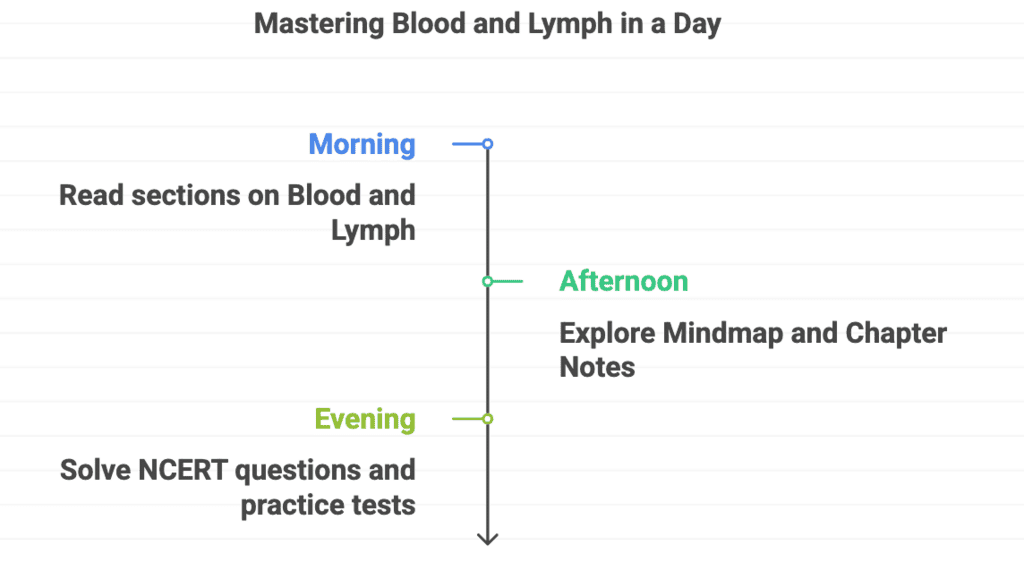
Day 2: Blood Groups and Circulatory Pathways
Morning:
Read about Blood Groups and Circulatory Pathways in the NCERT Textbook. Understand ABO blood groups, Rh factor, and the structure of circulatory pathways. Make notes on key concepts.
Afternoon:
Refer to Blood Groups, Lymph & Circulatory pathway for detailed explanations. Study PPT: Body Fluids & Circulation for visual aids. Use Mnemonics: Body Fluids & Circulation to memorize blood group compatibility.
Evening:
Solve NCERT questions related to Blood Groups and Circulatory Pathways. Attempt Test: Circulatory Pathways and DPP for NEET: Daily Practice Problems to test your knowledge.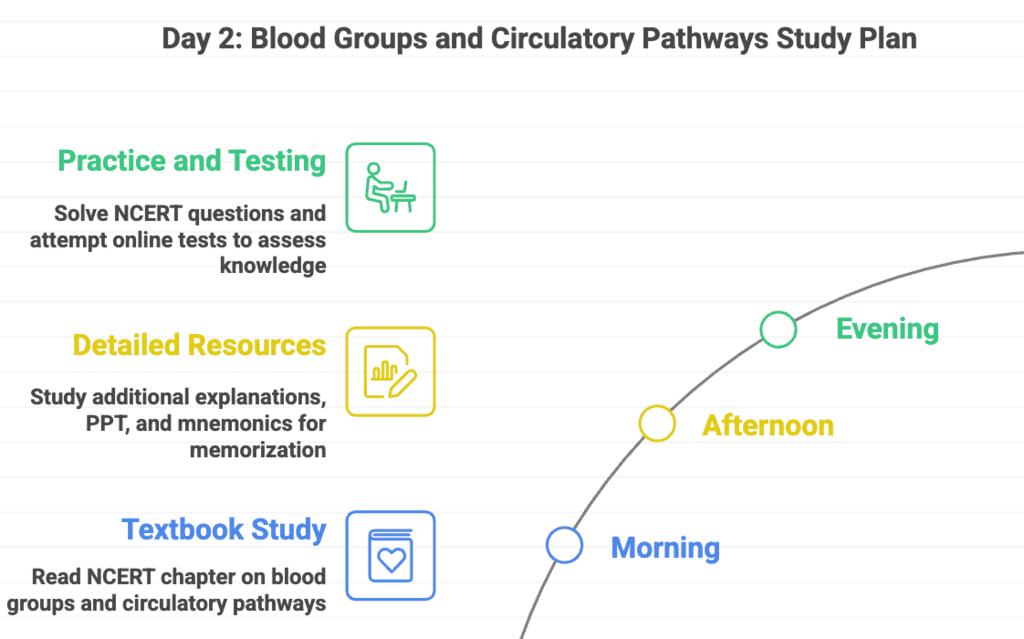
Day 3: Human Circulatory System and Double Circulation
Morning:
Study the Human Circulatory System and Double Circulation from the NCERT Textbook. Focus on the heart's structure, pulmonary, and systemic circulation. Summarize key points in your notes.
Afternoon:
Explore Human Circulatory System and Double Circulation & Disorders of Circulatory System. Review Important Diagrams: Body Fluids and Circulation to understand heart anatomy.
Evening:
Solve NCERT questions on Double Circulation. Practice with Test: Double Circulation, Regulation of Cardiac Activity & Disorders and Test: Body Fluids & Circulation - 1.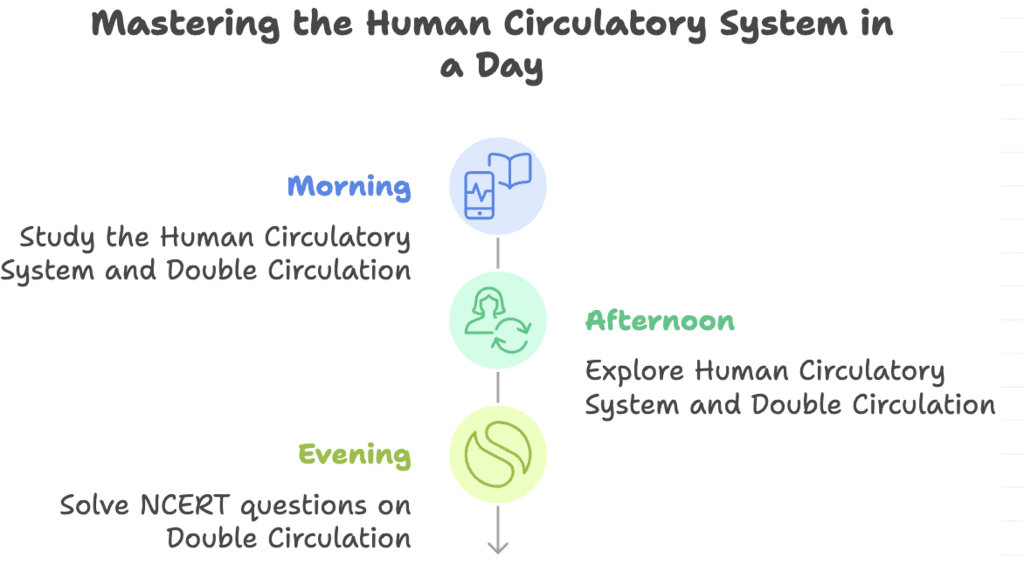
Day 4: Cardiac Cycle and Electrocardiogram (ECG)
Morning:
Read about the Cardiac Cycle and ECG in the NCERT Textbook. Understand the phases of the cardiac cycle and components of an ECG. Create concise notes.
Afternoon:
Study Electrocardiogram and NCERT Exemplars: Body Fluids & Circulation. Use Flashcards to memorize ECG waveforms.
Evening:
Solve NCERT questions on the Cardiac Cycle and ECG. Attempt Test: Cardiac Cycle (NCERT) and Test: Electrocardiogram & Circulatory Pathways (NCERT).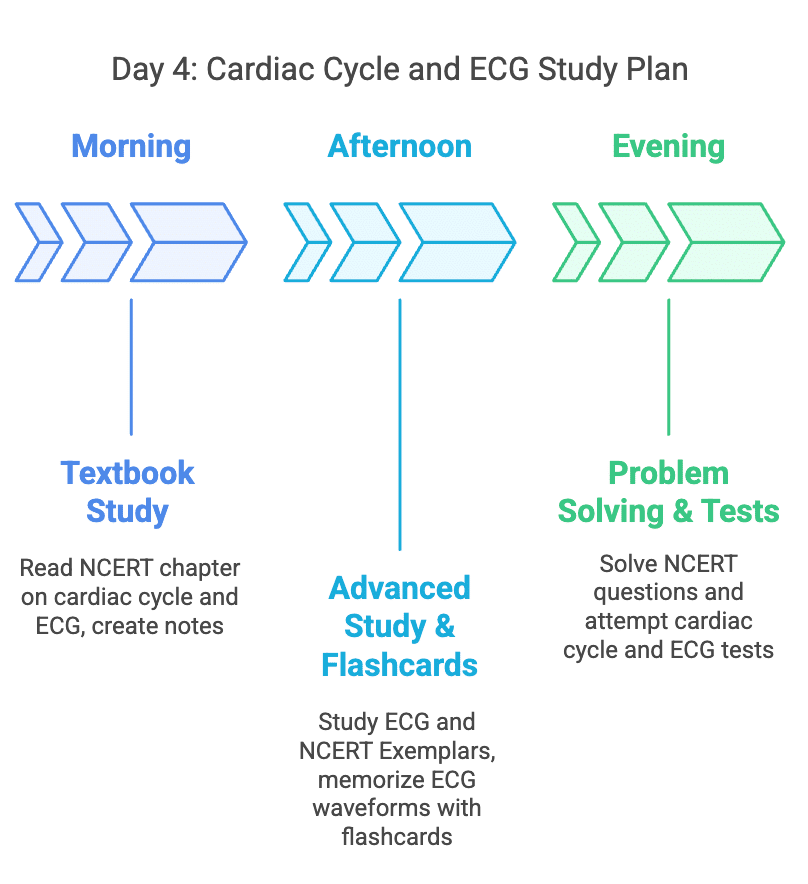
Day 5: Regulation of Cardiac Activity and Disorders of the Circulatory System
Morning:
Read about Regulation of Cardiac Activity and Circulatory System Disorders in the NCERT Textbook. Focus on neural and hormonal regulation and common disorders. Summarize in notes.
Afternoon:
Refer to Double Circulation & Disorders of Circulatory System and NCERT Solutions: Body Fluids & Circulation. Study Circulatory System: Fishes & Amphibians for comparative understanding.
Evening:
Solve NCERT questions on regulation and disorders. Practice with Test: Body Fluids & Circulation - 2 and DPP for NEET: Daily Practice Problems (Solutions).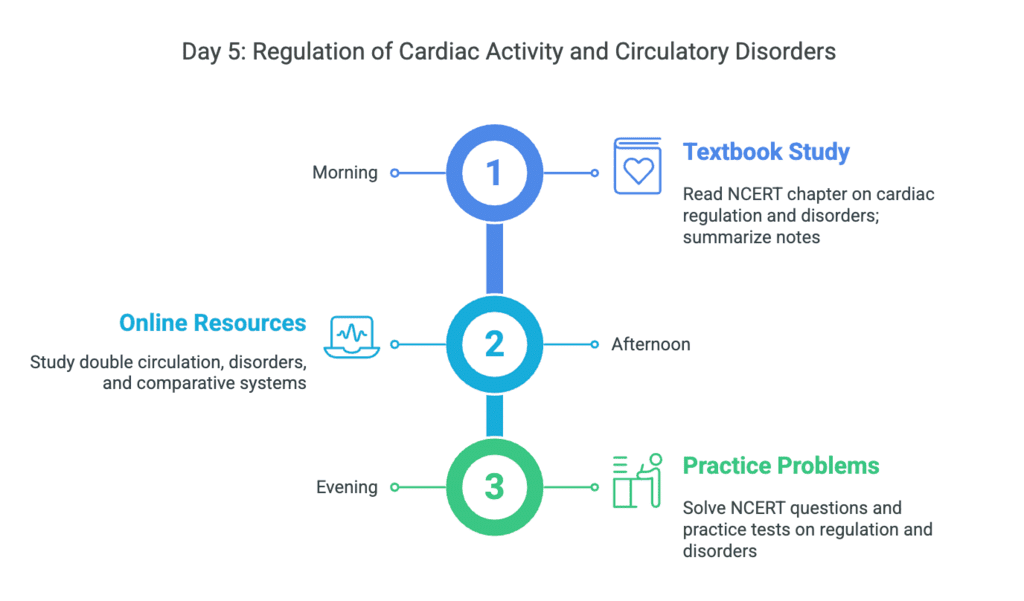
Day 6: Revision & Practice
Morning:
Review your notes from Days 1-5, focusing on key definitions, diagrams, and concepts. Revisit the Mindmap and Mnemonics for quick recall.
Afternoon:
Reattempt questions from NCERT and EduRev tests where you faced difficulties. Solve Test: Body Fluids and Circulation and NEET Previous Year Questions (2016-2024) to gauge your preparation.
Evening:
Discuss doubts with peers or a mentor. Take a final mock test using Body Fluids and their Circulation to assess your overall understanding.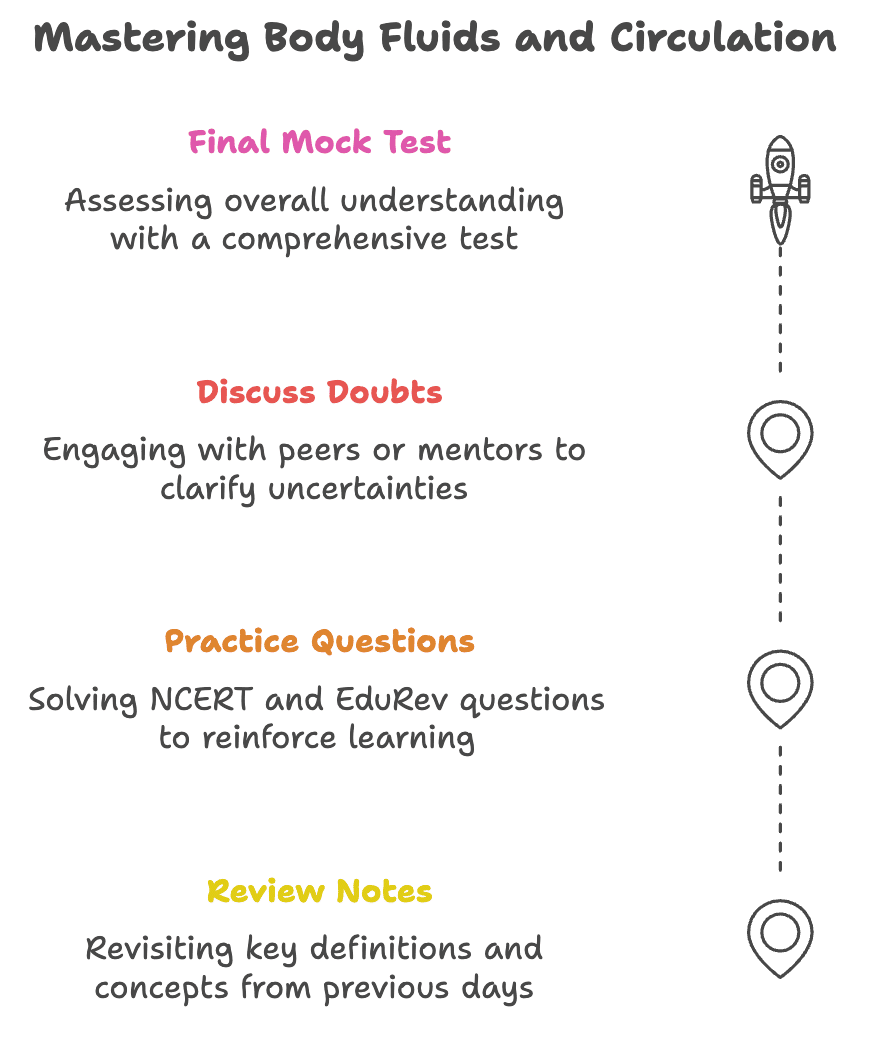
Additional Tips
In the NEET exam, you'll encounter questions like those in the links below. Solving these will help you identify weak areas. Revisit and practice more questions on challenging topics.
Important Links for the Chapter
By following this comprehensive study plan and leveraging EduRev's resources, you'll be well-equipped to master "Body Fluids and Circulation" and excel in the NEET exam. Good luck!
|
150 videos|399 docs|136 tests
|
FAQs on 6 Days Study Plan: Body Fluids and Circulation - Biology Class 11 - NEET
| 1. What are the main components of body fluids in humans? |  |
| 2. How does the circulatory system maintain homeostasis in the body? |  |
| 3. What is the significance of blood pressure in circulation? |  |
| 4. How do body fluids contribute to the transport of gases in the body? |  |
| 5. What are some common disorders related to body fluids and circulation? |  |





















